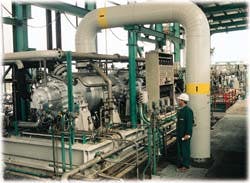New Argentine urea/ammonia plant to use four turbocompressor trains
An engineer inspects an ammonia-syngas compression train similar to the one that Nuovo Pignone will supply to Profertil.Nuovo Pignone, the Italian-based affiliate of General Electric (GE), has been awarded contracts totaling $29 million to supply four turbocompressor trains and fabricated equipment for a new Profertil SA ammonia/urea plant in Bahia Blanca, Argentina. This project, according to Nuovo Pignone, will include the largest single-train urea plant in the world.
Profertil, established in December 1996, is 50% owned by YPF. Construction for the new plant is being done by Techint SA, Argentina, and Snamprogetti, an engineering subsidiary of Italy's Ente Nazionale Idrocarburi (ENI). The plant will be based on a chemical process developed by Snamprogetti.
The new urea section will have a capacity of 3,250 tons/day, the highest capacity ever served by a single-line reaction. In the urea section, the compression train will consist of two centrifugal compressors and one steam turbine.
The new ammonia section will have a 2,050 ton/day capacity. Nuovo Pignone will supply three compressor trains for the ammonia section. The three trains will consist of two centrifugal compressors and one steam turbine for syngas compression to the reactor, two centrifugal compressors and one steam turbine for process air, and one centrifugal compressor and one steam turbine for ammonia refrigeration.
In addition to compressor trains, Nuovo Pignone will provide fabricated equipment for the project, including an ammonia converter and basket, a urea reactor, a carbamate separator, a urea stripper, and a carbamate condenser. The fabricated equipment is scheduled to be shipped in the first quarter of 1999.
The plant is slated to begin commercial operation in the year 2000.
Copyright 1998 Oil & Gas Journal. All Rights Reserved.
